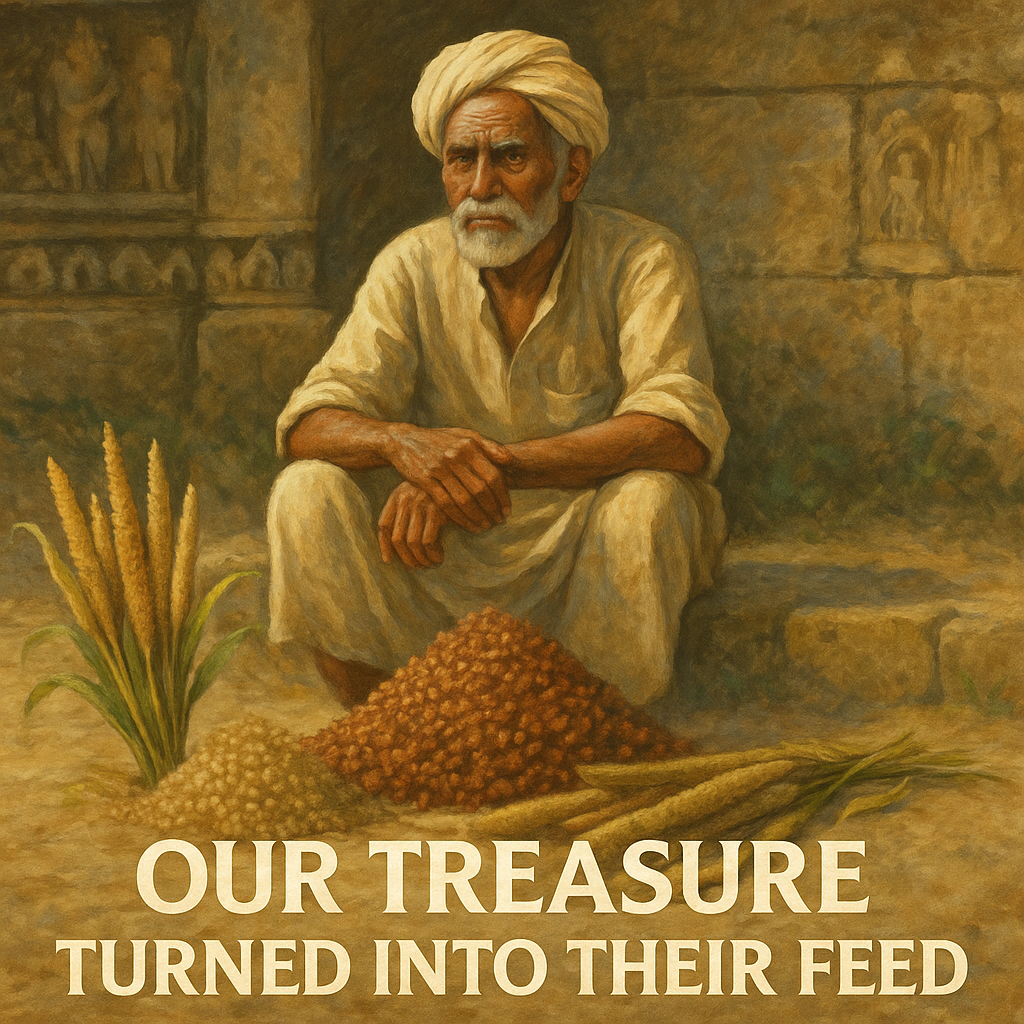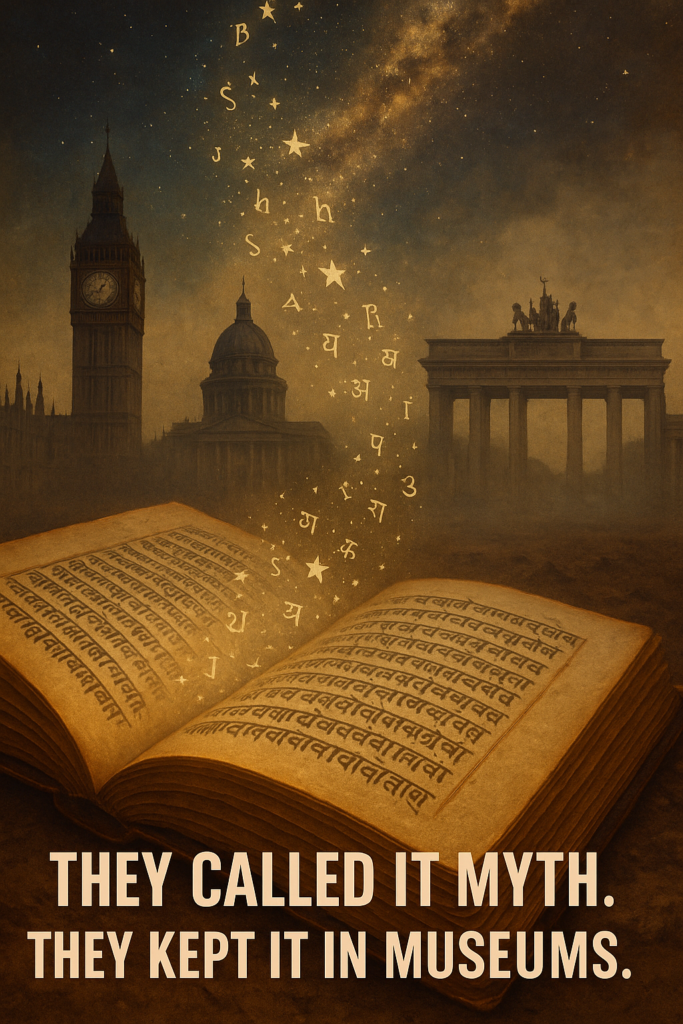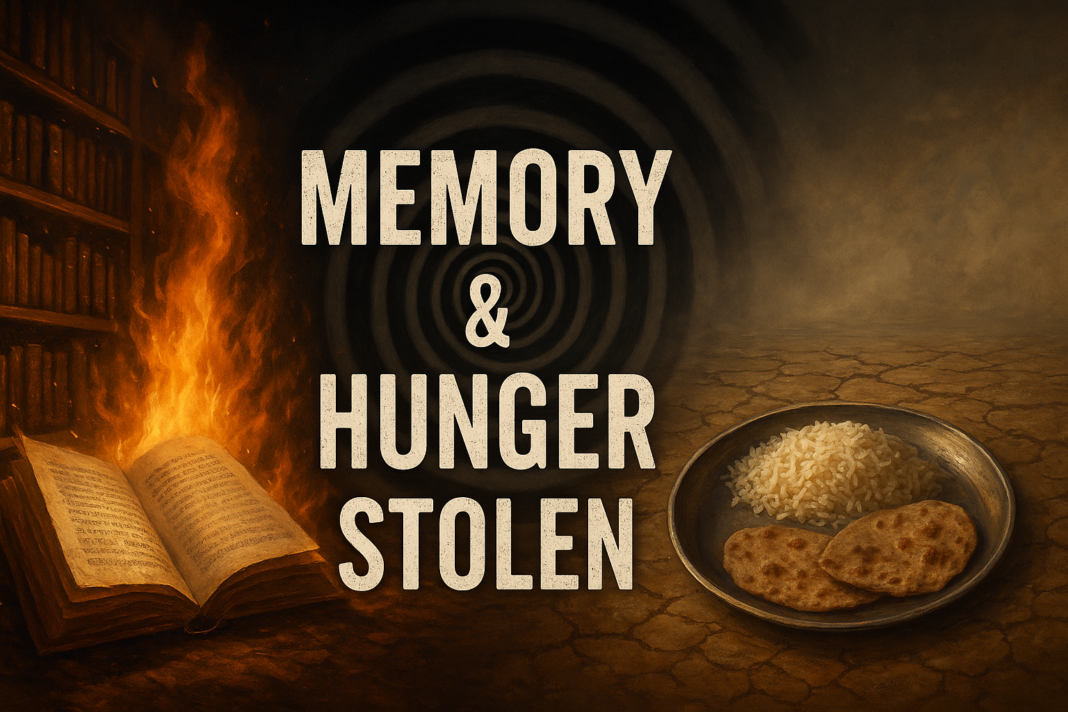First they stole our memory. Then they stole our food.
What remains of a civilization when its libraries become tombs and its fields turn into deserts of monotony?
What remains of a people when their songs are called superstition and their grains are mocked as cattle feed?
This is not just history. This is hypnosis.
Not just the loot of gold or land, but the theft of consciousness itself.
Two thefts broke the back of Bharat:
- The theft of Granths — our memory, our darshan, our timeline.
- The theft of Grains — our health, our sovereignty, our rhythm.
Together, they produced the perfect slave: one who does not remember his past and one who cannot stand on his own legs.
The Bundelkhand Testimony – A Conversation in Chanderi
One golden afternoon in Chanderi, I sat with my grandfather’s friend. His eyes had the depth of rivers that have seen empires rise and fall. I leaned forward and asked with childlike wonder:
“Baba, what were our ancestral crops in Bundelkhand? What did our soil feed our people with?”
He smiled, as if opening a forgotten granth from his memory, and began to count on his fingers:
“Kodo, Jwar, Ragi, Urad, Chana, Mung, Tuar, Til, Jau.”
I gasped: “Oh, my! No wheat? No paddy? No soybean?”
He shook his head slowly.
“No, beta. These were not our foods. These came later — imposed, traded, forced. What you just heard were the real treasures of Bundelkhand. That is why Bundelkhand is poor today. Because we lost them.”
Then his voice lowered, carrying the weight of centuries:
“Do you know, Chanderi was once among the most prosperous cities of Bharat? When Babar attacked, this city had more than three lakh people — larger than London of that time. Chanderi had sixteen thousand havelis. Its silk was so prized that it was traded for gold in the West. This was no backward land, beta. It was a city of wealth, looms, music, and markets.”
My heart skipped. “Oh my! Sixteen thousand havelis? Silk traded for gold? And today, people call Bundelkhand backward?”
He nodded, pain flashing across his face.
“Yes. First they began with words — they called Jwar ‘the poor man’s grain’ and Kodo ‘cattle feed.’ Slowly demand fell. Prices collapsed. Then they began to buy our grains for their animals while telling us to eat wheat. They pushed wheat into rations. They called our farming primitive. Then came the final blow — they banned Kodo from the mandis. The proud farmer who once sold Kodo in Chanderi’s bustling bazaar was forced into silence. Bundelkhand’s wealth disappeared. Poverty and water crisis replaced abundance.”
As he finished, silence fell heavy. The ruined arches of Chanderi seemed to weep with his words. I whispered to myself:
“So this is how hypnosis works. Not only looting manuscripts but also mocking our grains. Not only stealing books but also silencing the thali. Not only burning libraries but also killing mandis.”
The elder closed his eyes and murmured:
“Our crops were our treasure. They stole them to make us slaves.”
And in that moment, the story of Bundelkhand’s fall stood before me — not written in textbooks, but carved in the wrinkles of an old man’s face and the ruins of Chanderi’s fort.

The First Theft – Granths (Memory)
A Burning Galaxy
A granth is not paper; it is a galaxy. Every akṣara a star, every śloka a constellation. When colonizers burned or looted our texts, they did not burn ink — they burned cosmos after cosmos.
Where Are They Now?
- British Library, London → ~25,000 manuscripts
- Bibliothèque nationale de France, Paris → ~7,000
- Staatsbibliothek, Berlin → ~4,000
- Lisbon Archives → ~3,000
- Cambridge & Oxford → thousands more
- Library of Congress, USA → ~2,500
👉 If we were “primitive,” why do Europe’s libraries overflow with our manuscripts?
The Colonial Propaganda Machine
- Vedas → reduced to “primitive hymns”
- Upaniṣads → dismissed as “impractical musings”
- Purāṇas → mocked as “fantasy”
- Rāmāyaṇa & Mahābhārata → labeled “mythology”
Sanātan wisdom remembered Chaturyugas, Manvantaras, Kalpas spanning millions of years. Colonizers shrank this infinity into a 5,000-year straight line. Erase cycles, enforce linearity — memory collapses.
Max Müller & Company
Max Müller translated the Ṛgveda and fixed Indian history at 5,000 years.
William Jones forced Indian kings into biblical chronology.
James Mill wrote History of British India without ever visiting.
This was not scholarship. This was hypnosis.
The Consciousness Theft
By mocking our memory as “myth,” they robbed us of our dignity.
They looted not just books but the timeline of civilization itself.

The Second Theft – Grains (Hunger)
If granths were our smṛti, then grains were our prāṇ.
Mockery of Sacred Food
- “Poor man’s food” → Jwar, Bajra, Ragi, Chena
- “Animal feed” → Kodo, Kutki, Kangni, Sanwa, Makra
👉 Which grain does the animal not eat?
Cows eat wheat. Birds eat rice. Pigs eat soy. Why only millets degraded? Because colonizers needed cheap feed for their livestock industries.
They mocked our millets while their animals thrived on them.
Collapse of the Thali
Before colonization → diverse thali of millets, pulses, oilseeds, greens.
After colonization → wheat & rice monopoly.
📖 The Satna Story: Farmers brought Kodo millet to the mandi. Officials declared: “Kodo is non-commercial. It cannot be sold here.” From that day, Kodo vanished from markets. Policy killed pride. Hypnosis killed health.
Results
- Surplus wheat & rice
- Malnourished children
- Epidemic of modern diet diseases
From Annam Brahma to Annam Disease — this was the theft of hunger.
Impacts on Health
- Diabetes: 101 million Indians (ICMR 2023)
- Hypertension: 220 million adults
- Cholesterol: 25–30% abnormal lipids
- Cancer: 14 lakh+ new cases annually
- Malnutrition: 35 million children
They looted not just our grains. They looted our health.
The Double Impact – Mind & Body Enslaved
- Granths stolen → memory lost
- Grains stolen → strength lost
Together → civilization hollowed out
A nation without memory is enslaved.
A nation without food is weak.
A nation without both is hollow.
Poetry – Between Grains & Memory
Sing, O sorghum, pearl and fingered flame,
Once called “poor,” yet rich in name.
Little millet, barnyard’s pride,
Fed the sages, yet vilified.
When granths were burned, our memory drowned,
When grains were mocked, no strength was found.
Mind enslaved, the body weak,
Civilization bent, subdued, meek.
The Path of Recovery – Swarāj of Memory & Food
Reclaim the Granths
- Read one page daily of Itihās, Purāṇa, or Upaniṣad.
- Teach the Rāmāyaṇa as memory, not “myth.”
Reclaim the Grains
- Eat one fistful of Sri Anna (millets) daily.
- Restore pulses, oilseeds, greens to the thali.
Reclaim Consciousness
- One page.
- One fistful.
- One mantra.
This is how hypnosis breaks. This is how rhythm returns.
🌾🔥 Take the One Fistful Pledge
Every revolution begins with a small act.
👉 Eat one fistful of Sri Anna (millets) daily.
👉 Read one page of our granths daily.
👉 Repeat one mantra daily.
This is not just diet. This is not just memory.
This is Swarāj of the mind and the body.
[✅ Join Milletarian Sangha — Take the Pledge]
Final Quote – Jagran Sutra
“A civilization does not fall when armies lose. It falls when memory is mocked and food is abused. Restore the granths — the mind shall wake. Restore the grains — the body shall take. Restore them both — Swarāj we make.”
Conclusion – The Jagran Call
First theft: Knowledge.
Second theft: Food.
Third theft: Freedom.
The colonizer locked our manuscripts in their libraries and mocked our grains in their markets. But the soul of civilization cannot be caged forever.
🌿 Sangha Mantra:
- Annam is Dharma.
- Granth is Smṛti.
- Together they are Swarāj.
🌾🔥 Do not stop at reading, Bandhu. Act.
Bring back one fistful of millet to your plate.
Bring back one page of your granths to your day.
And then, walk with us in the Milletarian Sangha — where we awaken not just ourselves, but an entire civilization.
👉 One Page. One Fistful. One Sangha. One Swarāj.
[🌾 Join the Milletarian Sangha Now]
📚 Reference Links for Blog
-
-
The ICMR-INDIAB study (diabetes & metabolic disease in India) — https://www.thelancet.com/journals/landia/PIIS2213-8587(23)00119-5/fulltext The Lancet+2ScienceDirect+2
-
Lessons Learnt from the ICMR-INDIAB Study (National Medical Journal of India) — https://nmji.in/lessons-learnt-from-the-icmrindiab-study/ The National Medical Journal of India
-
ICMR Guidelines for Management of Type 2 Diabetes (2018) — https://www.icmr.gov.in/icmrobject/custom_data/pdf/resource-guidelines/ICMR_GuidelinesType2diabetes2018_0.pdf ICMR
-
British Library — Asian & African Studies / South Asian Manuscripts — https://bl.libguides.com/reference-services/asian-and-african-studies bl.libguides.com+2bl.libguides.com+2
-
Digitized Manuscripts at British Library — https://bl.libguides.com/reference-services/asian-and-african-studies/introduction/digitised-manuscripts bl.libguides.com
-
Library of Congress — South Asian Collections (rare books, manuscripts) — https://guides.loc.gov/asian-collections/south-asian-collection Research Guides
-
“Why 2023 is the International Year of Millets” (FoodPrint) — https://foodprint.org/blog/international-year-of-the-millets/
-
Promoting Millets: Charting a Journey from Food Security (PMC article) — https://www.ncbi.nlm.nih.gov/pmc/articles/PMC10900443/
-
MyGov – Millets 2023 Campaign (India govt) — https://www.mygov.in/campaigns/millets/
-
Vandana Shiva / Navdanya — https://navdanyainternational.org
-

